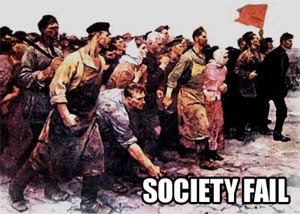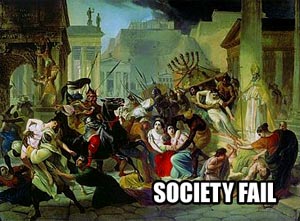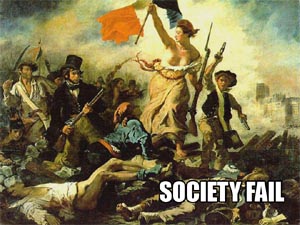Thresholds
Whenever the words “it’s the natural way” appear in debate or in print, I groan inwardly. They once seemed such an easy thing to say; granola, monogamous marriage, friendship and eating vegetables were “natural,” and soft drinks, aggressive selfishness, and living in tiny air-conditioned boxes were “un-natural.”
But then someone pointed out the first paradox: if we’re a product of nature, anything we do is natural.
To that I added that natural selection would enforce natural on us; but then I realized that natural selection is defined by our actions. If our society suddenly made penis size all important, in a few hundred years we might be idiots of violent dispositions, but all the men would have huge penises, even grotesque ones like the purple buttocks of baboons.
 So what is natural? I’ve come to realize how this term means little because when we made fire, invented agriculture and learned to speak, we left the realm of the previously natural. We left natural selection behind for social selection; we made use of tools and technology just as natural as digging up roots with our bare hands and catching squirrels with our teeth.
So what is natural? I’ve come to realize how this term means little because when we made fire, invented agriculture and learned to speak, we left the realm of the previously natural. We left natural selection behind for social selection; we made use of tools and technology just as natural as digging up roots with our bare hands and catching squirrels with our teeth.
From that realization came a more profitable one: since we are in the driver’s seat, and define our own destiny, we can choose what is natural as in “fits into the type of pattern designs we see in nature,” or can cut to the chase and pick what we find to be better designs, more beautiful ways of living, and so on — because the most natural thing in nature is challenging us with thresholds.
What do I mean by thresholds? I mean that there’s a default way of doing things that just works, as in all things in nature. It starts out as a hack, or temporary unorthodox fix, and through gradual improvement (natural kaizen) it evolves into something highly refined, even if its original design was awkward. What challenges evolution? Each time one of these hacks becomes the norm, there’s a reward for getting over it.
For example, early hominids found life to be OK. They hunted and gathered in groups, and were able to survive. But at some point, probably spurred on by emotion, they saw that life could be better if they were able to harvest most of their food, trading a diet of pure protein for a more regular diet. That meant they needed fields, and fire to cook the food, and permanent dwellings that were also defensible.
This was a threshold: could they escape the natural of old for the natural of new, which meant altering themselves?
Another example in a fixed society is this: we find it most natural to wander outside and take a dump wherever is convenient. But when you have a group, that becomes toxic quickly. So there’s a threshold: do we find a way of concentrating and removing our waste, or do we die in horror of feces-born diseases, or do we give up on fixed societies and go back to hunter-gathering?
It was natural to wander around foraging, and it was equally natural to construct sewer systems.
As time went on, we discovered another dimension: societies need some kind of morality. We faced two extremes:
- Let the most aggressive dominate us through violence.
- Let our fear of aggressive dominators cause us to reject collective organization and centralized power, and thus die slowly through inaction regarding non-immediate but still vital socialized problems.
You may recognize these two extremes: the far right believes in the former, and the far left believes in the latter. They’re still with us because we’re still fighting out this challenge, which is a threshold that nature offers to us with a reward if we cross it and a default state of OK-not-great if we don’t.
And all three outcomes — pass, fail, or abstain — remain “natural,” but the question faces us of which do we choose?
 Nihilism as I see it is the rejection of all inherent values. There are no writings on the wall; there is no Word from the other side that didn’t pass through humans, getting distorted in the process. There is no instruction manual to life. So we must look at our options and choose not only which seems most logical, but which appeals to our emotions and sense of aesthetics.
Nihilism as I see it is the rejection of all inherent values. There are no writings on the wall; there is no Word from the other side that didn’t pass through humans, getting distorted in the process. There is no instruction manual to life. So we must look at our options and choose not only which seems most logical, but which appeals to our emotions and sense of aesthetics.
Emotions and aesthetics after all wouldn’t exist if they didn’t serve some purpose. My guess is that their value is in their non-linearity. They consider many factors at once as a single factor. That kind of decision-making is not useful when choosing between one tool or strain of grain or another, but it’s very useful when getting up the impetus to brave doubt and opt for a change, like first learning to make fire or domesticate grain. The choice to make those choices came from pure passion.
We are in the driver’s seat. We must design our own futures. We cannot count on something being “natural” any more than we can count on writing on the wall or God screaming instructions to us through a psychedelic telepathic loudspeaker. (This is not an argument for or against God, but a statement of fact: we do not, as a group, perceive instructions from the world beyond.)
Deferring to nature is dangerous because it has us arguing from a foregone conclusion instead of considering the results at hand. What should we do? Well, what does God/the blue book/nature say? Yet there’s another hidden foregone conclusion: the individual. What do all individuals, representing the idealized individual, say?
It’s fallacious to argue from the individual because history shows us that individuals in a group default to lowest common denominator behavior, and individuals alone if given a choice pick the safer action — the one with the least risk. That doesn’t get us over the threshold; it keeps us in the default behavior.
Like a game of Secret, societies over time break down ideas into their simplest forms. This means that the default behavior, if not countered by a strong impetus to cross a threshold, results in decay of social order over time. As the old saying goes, if you’re standing still, you’re actually moving backward in a river of passing time and entropy.
What would this ongoing self-reducing default be, in our modern time? It’s a curious type of conservatism — the kind that places the individual above all else, and so is unwilling to inconvenience anyone. It’s the default that says we should divide up our wealth and focus on each other’s psychology, not try to move forward collectively. On the left it is anarchy, on the right it’s American conservatism or libertarianism. Same impulse: stick with the default, because it doesn’t challenge us as individuals.
 But this lack of desire to surge over thresholds comes at a cost. Individualism of the rugged kind decays into convenience. Anarchy creates consumerism on a vast scale. Libertarianism encourages the wealthy to withdraw from society until the rest of society saddles itself with so many problems it explodes in revolution, and then libertarians die outnumbered a thousand to one. History shows us this pattern repeating like wallpaper. It’s the universal “society fail” that marks the end of productive existence for a civilization.
But this lack of desire to surge over thresholds comes at a cost. Individualism of the rugged kind decays into convenience. Anarchy creates consumerism on a vast scale. Libertarianism encourages the wealthy to withdraw from society until the rest of society saddles itself with so many problems it explodes in revolution, and then libertarians die outnumbered a thousand to one. History shows us this pattern repeating like wallpaper. It’s the universal “society fail” that marks the end of productive existence for a civilization.
This creates a bizarre hybrid of individualism, utilitarianism, bureaucracy and anarchy. It is created by a struggle for control by the individual: when faced with a group, the individual must appeal to the group in order to have power. So they construct a virus of honey, not vinegar. “If we’re all equal as a group, we each get what we want, and we don’t have to face any thresholds.” Thus the individual uses the group to achieve independence from the group, at the expense of collective action, which would cause conflict in the group. In turn, because “independence” and “freedom” don’t address a balance between individual needs and group needs, strong control forces are needed — with a centralized administration, of course — to apply the rules of the herd onto the herd and so to filter out destabilizers, both predators and ideologues who oppose this strange jury-rig.
Although it seems completely weird, it’s very normal, at least in the latter half of a civilization’s lifespan. It allows us to indulge in the idea of “equality,” otherwise known as interchangeable parts, in which we treat individuals as composites who can be controlled by providing the right motivation and threats. We don’t treat them as individuals; we treat them as political individuals, or people who can be managed. The more we strive for freedom and individualism, on an external level, the more we get away from it on an internal level.
In this sense, all of society’s history is like watching 4chan’s /b: people show up and post memes, hoping a Personal Army will arise which through the force of its numbers, will crush the enemy. At the same time, the society functions under the pretense of individual choice determining when a personal army arises, even though the personal army is a mob spurred on by the lowest of human impulses: revenge, destruction, resentment and so on. And maybe this, too, is a threshold.
In other words, if we’re able to out-evolve our self-awareness and progress to a level in which we’re aware of self, others and world at large at once, and make our decisions on that basis, we will have left an OK but not great default in favor of a more productive and beautiful way of living. It’s something to think about any time you see people doing what is natural for this time, and yet remaining unfulfilled as they see nothing of greatness on this side of this latest threshold.
Tags: anarchy, cognitive dissonance, crowdism, democracy, passive aggression









